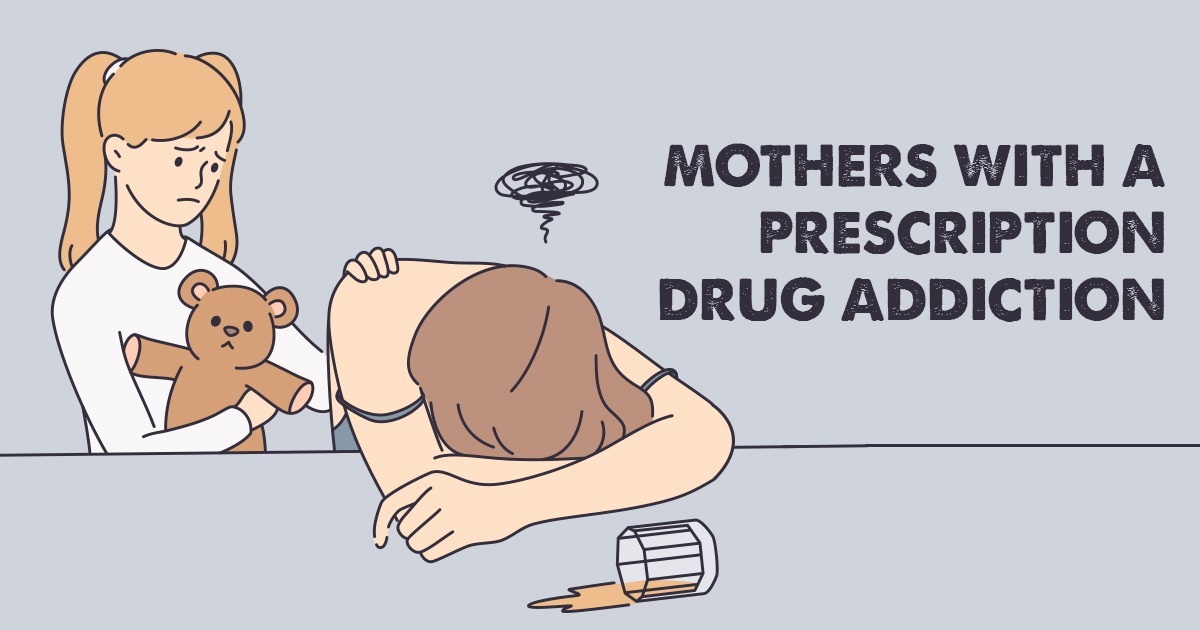
Prescription drug addiction is relatively common but also devastating. Being addicted to prescriptions is destructive to individuals, families, and communities. Others who have an addiction to prescription substances, whether they have older children or are currently pregnant, may avoid getting the help they need and deserve. There’s an unfortunate stigma.
In treatment, it’s so important to find a program that speaks to your needs as a woman and mother or mother-to-be, breaking down those walls you may feel about getting help.
Below, we delve into what to know about prescription drug addiction in general and the health effects for babies born to mothers addicted to these substances.
Before doing so, we want to emphasize the message to any mother or soon-to-be mother that no matter where you are in your life, it’s never too late to get help in a drug addiction treatment program.
Understanding Prescription Drug Abuse
According to the Substance Abuse and Mental Health Services Administration, in 2015, nearly 19 million Americans over the age of 12 reported prescription drug abuse over the previous year. That number is likely higher now in the United States.
There’s often an unfortunate misconception that it’s safe because something is available by prescription or a doctor gives it to you. However, many of these drugs, and opioids, in particular, are more deadly than illegal drugs or street drugs.
- Addictive drugs of any kind, including prescriptions, affect your brain’s reward system. These effects can trigger an addictive response.
- While you might start taking a prescription drug as prescribed initially for a medical condition, a substance use disorder can develop over time.
- Then, the use of the drug is no longer in your control. Developing physical dependence is also common with the use of an addictive drug.
The most commonly abused prescription medications are central nervous system depressants. Central nervous system depressants include benzodiazepines like Xanax and opioid pain medications.
Taking a prescription or illicit opioid can slow your central nervous system down so much that you experience a drug overdose. Breathing and heart rate can slow to a dangerous or deadly level for drug users who take doses more than their bodies can handle.
Opioid Addiction and Abuse
While other prescriptions can lead to a substance use disorder, opioid painkillers are the most significant in terms of addiction and abuse. The use of opioids led to an epidemic in America, with hundreds of thousands of overdose deaths and other adverse effects.
- Opioid prescription medicines are for severe pain, including chronic pain.
- Symptoms of use may also include euphoria and relaxation.
- Other adverse effects of opioid use are confusion, lethargy, drowsiness, dizziness, nausea, vomiting, and constipation.
- Oxycodone is one example of a prescription drug with high abuse potential. Available under the brand name OxyContin, oxycodone changes how the central nervous system responds to pain.
- Codeine, fentanyl, and Demerol are also opioids with high abuse and addiction rates, according to the National Institute on Drug Abuse.
- Opioid medications act on the brain and body the same way as heroin, which is also an opioid, although it’s not legal.
Opioid dependence can lead to withdrawal symptoms, which can be challenging to deal with. When you’re physically dependent and go through opioid withdrawal, you can experience anxiety, sweating, nausea, vomiting, and other problematic symptoms.

Neonatal Abstinence Syndrome (NAS)
If you’re pregnant and addicted to prescriptions or have an opioid use disorder, we encourage you to contact us to learn about treatment programs geared specifically to your needs. Again, it’s never too late in your pregnancy or even your child’s life to get help.
- An issue called neonatal abstinence syndrome, or NAS, can occur when a baby is exposed to drugs in the womb before birth.
- The drug that most often leads to NAS is a prescription opioid or illicit drugs like heroin.
- NAS is a set of conditions that occur when a baby withdraws from drug exposure in the womb.
- Along with opioids, benzodiazepines and antidepressants can cause symptoms of NAS.
- Medications can pass through the placenta, creating problems for babies born to mothers addicted to prescription drugs.
- Most of the symptoms of NAS happen within a few hours after birth, but some may not appear for a few weeks.
- These symptoms can last up to six months after delivery.
NAS signs and severe withdrawal symptoms in a baby include
- Body shakes and tremors
- Seizures and convulsions
- Twitching and overactive reflexes
- Tight muscle tone
- Excessive crying or fussiness
- A high-pitched cry
- Slow weight gain or poor sucking
- Breathing problems
- Fever or sweating
- Yawning or sleep problems
- Throwing up
- Diarrhea
- Sneezing
NAS’s particular signs and risk factors depend on how much of a drug you used and how long you took it. Individual factors play a role, like how your body metabolizes the substance and whether you have underlying conditions such as chronic pain requiring treatment.
Babies born with NAS may need specialized medical care in the newborn intensive care unit (NICU) after birth as they experience withdrawal symptoms. Harmful effects and complications of NAS, especially from opioid medications, may include:
- Low birth weight or premature birth, meaning the baby is born weighing less than 5 pounds, 8 ounces
- Jaundice leads a baby’s skin and eyes to look yellow and is the result of liver issues
- Seizures
- Sudden infant death syndrome (SIDS)
Long-term effects that can occur because of prescription drug misuse, including opioid abuse, during pregnancy include:
- Delays in development milestones, such as walking, talking and sitting
- Motor problems, which affect muscles and movements
- Behavioral and learning issues
- Difficulties with speech and language
- Sleep disturbances
- Ear infections
- Vision problems
Prescription Drug Addiction Treatment
Whether you’re currently pregnant or already a mother, your treatment plan will probably begin with supervised detox if you have a drug addiction.
- Supervised detox means a medical team will help you lower your dose of the substance in a safe and controlled way while managing any physical health conditions.
- From there, you can begin treatment for your addiction to opioids or prescriptions, including behavioral therapy, and work with counselors.
- If you’re pregnant or already a mother, looking for a treatment center specialized for women with children can be a valuable resource to minimize any potential risks and help you feel comfortable.
- Along with the treatment for the addiction itself, a program geared toward women and mothers can provide parenting and pregnancy education, individual therapy and family therapy, and help with steps you may need after treatment, such as finding housing and childcare.
- When you choose a substance use disorder treatment center that works with a female population, in particular, they’re going to help alleviate the anxiety you might be feeling.
- They’re going to understand what it’s like to provide care for you and your unborn child and help you become the mother you want to be and improve neonatal outcomes.
What Can You Do If You’re Struggling with Substance Abuse?
If you are pregnant and dealing with prescription drug abuse, including an opioid use disorder, you can talk to a health care provider right away.
Tell your doctor about what you use, but don’t stop any substance without telling them. There are some prescriptions, including opioids, that can cause dangerous signs of withdrawal.
If you try to stop cold turkey when you have opioid dependence on prescription painkillers, your baby could die. Instead, it’s best to get professional, guided prescription drug addiction treatment so you can wean off of the substances safely and correctly, especially with long-term opioid use.
Medication-assisted treatment might help, such as buprenorphine and methadone for opioid addiction.
You shouldn’t take any medicine, including prescription pain relievers, without first talking to your doctor about your pregnancy. If you’d like to learn more about addiction treatment for women and mothers, call the Anchored Tides Recovery team at 866-600-7709; we’re available to provide you with information.































